This post originally appeared on I Read Odd Books
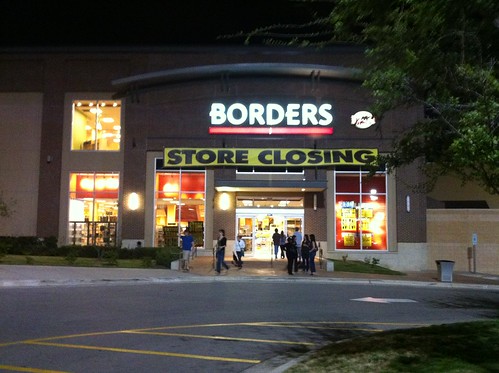
Yep. Death. And no matter how much the Borders corporate offices try to spin that the company is regrouping, doing this, that and the other and it will all be okay, you should know Borders is dying and in five years or less will be completely gone from the book-purchasing landscape in the United States. There are a bunch of reasons for his and they have been hashed and rehashed since Borders announced they were closing a ton of stores, but I’m past that stage of grief, the anger stage when you assign blame and demand answers. At the moment, I am hovering between depression and acceptance.
Does this sound melodramatic, mourning the loss of a bookstore? It might be to some people. There is a sense that mourning should be kept special for humans or animals, but as a person whose life revolves around books – the reading of books, the procurement of books, the handling of books, the visual appeal of books – losing a book store that has been a part of my life for over a decade affects me deeply.
I read electronic books and dead tree books but have a definite preference for the latter and I buy them everywhere. Thrift stores, big box stores, publisher sites, Amazon, and, of course, book stores, independent and corporate. I don’t dislike Barnes and Noble, but Borders was always my favorite corporate book store. It’s as tenuous to explain this as it is to explain why you like only one of two very similar people. Border’s just visually appealed to me more. Its arrangement appealed to my sense of logic. The book selection, though similar between the two, was just a little more focused on my interests. It is hard to explain, sort of ephemeral, but Borders was a comforting place to me. I never used the store as a place to write, or hang out, or drink coffee. It was a place where I went to have a book-absorbing experience.
Mr Oddbooks and I discussed whether we wanted to go to Borders one last time, sort of visiting a dying a friend before the inevitable death, or just remember the store the way we loved it. We decided not to go back, but one evening while we were out, I just decided to go. But it wasn’t seeing a dying friend.
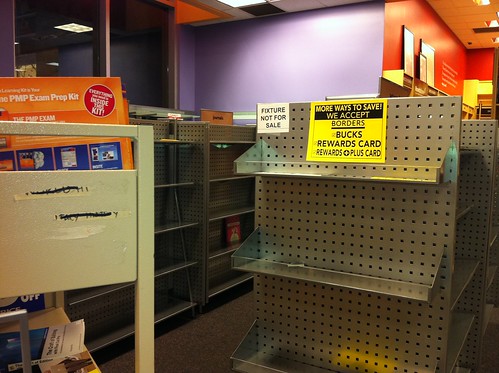
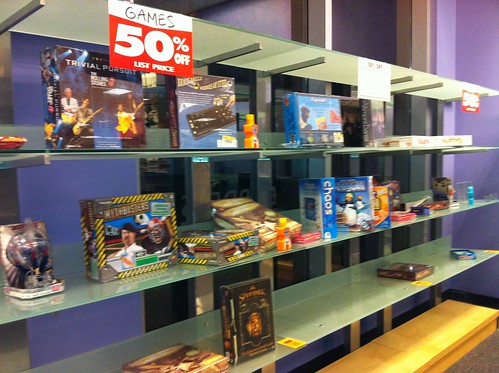
The friend was dead, its body picked over, bones exposed.
So, my friend is already dead. Let me eulogize my dead friend.
Mr Oddbooks and I are not drinking sorts of people, nor are we the sorts who like posh restaurants, so during times of celebrations, we went to Borders. I am not kidding one little bit. During times of great happiness, we went to Borders and dumped a couple to a few hundred dollars.
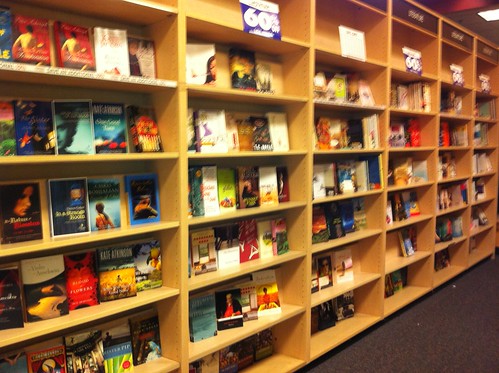
I would wander the fiction sections and pick up any book whose cover appealed to me. I bought my first David Foster Wallace book at this Borders the day Mr Oddbooks landed his current gig after two years of instability. I remember that evening very clearly. He bought some of those expensive computer magazines that cost more than a hardcover book and I decided to buy books I had never heard of before or writers I had been hesitant to read. Wallace, whose face I had seen in a dream a month before, called to me. I got Infinite Jest and Brief Interviews with Hideous Men. I’ve read the latter and don’t know if he’s my cup of tea or not but had I not been standing in front of the books with a deep will to purchase a book, any book, I would never have read him. Amazon serves me well when I know what I want, but not so well where impulses are concerned. I also bought a book based solely on the fact that there was a Stephen Fry blurb recommending it on the cover. Most importantly, I purchased Fay Weldon’s Chalcot Crescent. Fay Weldon is one of my favorite writers, full stop, yet finding copies of her recent releases in book stores can often be difficult. I am currently reading it and it is eerie how it seems to foretell what happened to Borders, what will happen to other business, and what is happening to governments all over the world. I think I was meant to buy that book when I did. Books can carry a lot of fate between their covers.
We frequently went to Borders during times of happiness, but for some reason, happiness doesn’t cut into my memory the way sadness does.
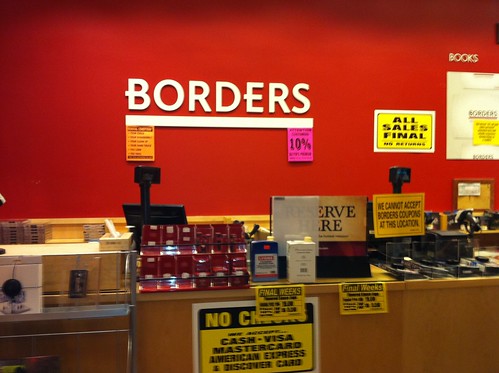
I had a job at an educational publishing company and I hated it. I had been sold a bill of goods about what I was going to be doing and the only reason I didn’t walk off the job two weeks after I started was because Mr Oddbooks also worked there and I was only given the job out of deference to him (I found out later two other women had, in fact, quit less than a month after accepting the position that eventually tricked down to me so I probably could have left and no one would have thought much of it). But I did the job poorly and it was clear I hated every moment I was there. But the company got sold, I was losing my job (though I quit before that happened), and even Mr Oddbooks’ job was threatened. I was in my cube one day, listening to NPR, and heard about a book called Free Food for Millionaires by Min Jin Lee. It sounded much like what I was experiencing, aside from the Korean cultural influences, and I wanted a copy. I worked just up the road from this Borders so I popped in and tried to find the book.
I couldn’t, so I went to the counter and asked the clerk to help me as the computers said they had it and it was in Literature. Suddenly, behind me, a woman who was from corporate tried to help me find it and took me back to the area where I had already looked, declared they were out and sent me back to the front counter so a clerk could get my information so they could order a copy. Then she went back to conferring with the other corporate drones, keeping an eye on the clerk who was helping me. A small Asian man, he said, very quietly, “I know where the book is. If you wait for ten minutes, I’m off the register and can get it for you.” The woman kept an eagle eye on him during all of this so, as a former retail clerk, I knew he was both trying to help me while not drawing attention to something that could potentially mean trouble. So I wandered off and checked out the sale books and sure enough, ten minutes later, he came up to me with the book. “I don’t know why it keeps ending up in Romance…” he trailed off. It was a strange moment but showed me a lot about the kid who helped me find the book. He knew that store inside and out, he didn’t want to get his coworkers who moved books to inappropriate locations in trouble, and he knew corporate was not to be trusted. Smart kid. I put the book under all the others I was purchasing so the corporate drone wouldn’t see it and I started reading Free Food for Millionaires the moment I got home. Not since Edith Wharton’s The House of Mirth has a book spoken to me so clearly in a moment of dread-filled crisis.
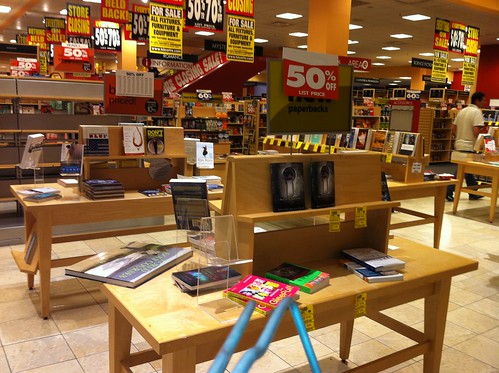
In June of 2008, right when Houghton Mifflin Harcourt was in the middle of outsourcing all our jobs to India and Ireland, Mr Oddbooks and I also lost our precious cat, Daisy. Daisy was the feline embodiment of joy, and after we had to put her to sleep, we came back home, wandered around in a grief haze, then decided we had to get out of the house. We went to Borders. I remember standing in front of this table. Where that book with the eyeball peeking through the keyhole is now stood Dewey: The Small-Town Library Cat Who Touched the World. I started to cry and an employee in a wheelchair noticed me. He didn’t ask me what was wrong. He just offered me a coupon for a free coffee upstairs. I didn’t use it. I still have it, in fact. In a box full of memorabilia that I had hoped I would do something meaningful with but probably never will.
The employees were always the reason to shop there. As we checked out our last time, I told the very young man who was ringing us up that I was sorry the store was closing and I hoped he had a good, new job lined up. He said he was a personal trainer on the side but was going back to school to get his nursing degree. The clerk next to him, who is a teacher in Austin, spoke up that it looked like he was going to lose his teaching job, too. He was going back to grad school because it would give him time to recover and determine what he wanted to do next. We all commented that at the moment, not even education was the failsafe it used to be. Teachers were secure in their positions, Harcourt used to be a stable educational publisher, grad school ensured you got a job. None of that is true anymore. The man going back to grad school sighed and said that at least in grad school he got a deferment on his student loans.
Borders is a microcosm of all that is beginning to suck heartily in this country. That which should be secure can be destroyed by a handful of megalomaniacs who think they have all the answers. And those at the bottom are left wondering where the hell they can go next. Good people who want me to have a book but don’t want to narc out a coworker, a man who sees a crying woman and silently offers her a free coffee – these are people who should never worry about where their next job should come from.
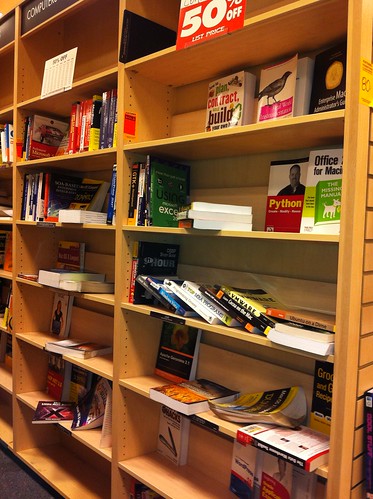
I felt a strange resentment toward the people who shopped with me, but I had to remember this was not their fault. This store was destroyed by men in suits who had no fucking idea what they were doing but were able to trick people into thinking they did. I shop on Amazon. I like to pay as little as I can for books. Everyone has to be conscious with their money and it is not the consumer’s fault that Borders’ management screwed things up so royally. I know I am not alone. I know I am not the only person who spent thousands of dollars every year at that Borders. Even if all those shoppers beside me were only there to pick the bones of the retailer, the fact is that vultures help clean things up. They are important in the real world as well as the retail world. Having nothing on the shelves cannot be more depressing than what this picture depicts – a maelstrom of mismanagement and depressed people forced to move on as the world ostensibly moves on around them.
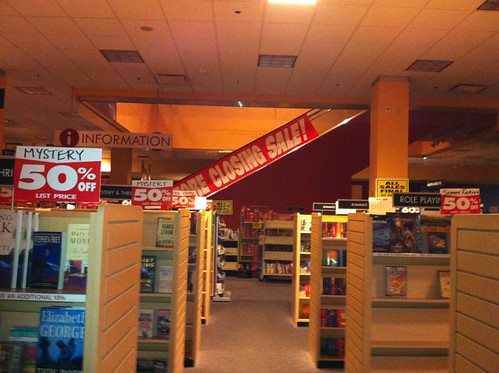
There was nothing left upstairs but fixtures to purchase. I used to love to comb through the Young Adult and Kids’ Books. I got there too late to see those sections still assembled. That’s probably for the best, because in my wandering mind books for children can too easily become children themselves and nothing is sadder than the death of a child.
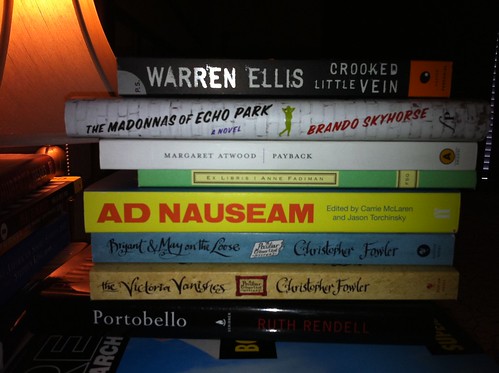
It was surprising that in those stripped shelves and chaotic messes that I managed to find some good books. For the love of sanity, I could so seldom find Christopher Fowler’s books on the shelves of any retailer but I found two that last night. I had heard a lot of good things about The Madonnas of Echo Park and I had wondered about Warren Ellis’ Crooked Little Vein and why not give it a try at 60% off. Ruth Rendell is one of my favorite authors, and I wasn’t aware the Margaret Atwood book even existed until I saw it. The others just caught my eye.
Just out of sheer perversity, I looked all of these books up on Amazon and with two exceptions, I still could get new copies cheaper when I take into account that I pay no taxes on Amazon. I don’t know what to think about how the economy works and I may well be part of a larger problem, but really I think the economy is changing and retailers who don’t take that into account will die, pure and simple. But no matter how cut and dried it is, death always hurts people in various ways. Things move on but it sucks mightily when you are in the middle of that change.
So if the Borders in your town managed to stay in business, shop there as much as you can because I sense it will not be there long. O the times, O the customs.








